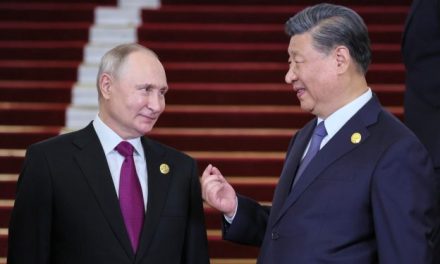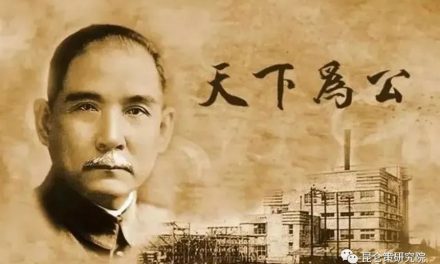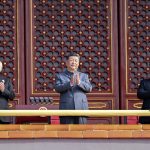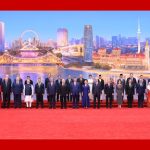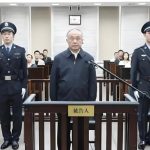By Guan Fengxiang
Editor’s note: What follows is an evaluation of an article that appeared in Singapore, and its publication may reflect dissent within the CCP. Like Kremlinology before it, understanding what goes in the the highest circles of power in the CCP is difficult. But the points the author raises are of interest.
Recently some students came to visit me, and handed me an “important article” published in Singapore’s “Lianhe Zaobao” [an editorially pro-Beijing newspaper] a few months ago. The title was “China must recognize its national conditions and find countermeasures” (hereinafter referred to as “National Conditions and Countermeasures”) [article in Chinese], and the author is Zeng Yongchang, a retired scholar from Sichuan. The students said that the article completely refutes China’s existing economic policies, which is really rare. Does this indicate that China’s top leaders wish to comprehensively review these policies? Or even change course? The students said that a previous article I wrote, “Comment on Ren Zhengfei,” was both deep and inspiring, so they hoped I could also comment on this strange article, which seems to be very well-known.
As almost everyone knows, “Lianhe Zaobao” is informally known as “The Great Foreign Propaganda Outlet.” Whether it has a special relationship with the Central Propaganda Department we do not know, but at least there is a tacit cooperation (perhaps private instructions?), so it dares to publish things that seem to be neutral, but are in fact alternative pro-China views. As for whether the author Zeng Yongchang is speaking with authority from the top, there is no proof. I have heard that he often writes comments for this newspaper and is known for his outspokenness. Maybe he is their “special guest writer”? I don’t waste words on particular people, but neither do I dismiss people because of their words. I don’t care about a writer’s background, but only whether the argument is rigorous and the logic is internally consistent. As long as it makes sense, I am willing to affirm it. Those who can add followers of their own are even more impressive.
Overall impressions
After a rough reading of “National Conditions and Countermeasures,” I feel that it has been endorsed or promulgated by high-level officials. Otherwise, not only would the risk for the author be too high, but it would also drag down the sales of the newspaper. The twelve economic issues listed by the author basically reflect the current situation in China, without exaggeration. It is not like the domestic official media, which usually engage first in “positive energy” bombardment, assaulting readers’ brains with fake and empty clichés, which kills one’s appetite. This “National Conditions and Countermeasures” article is different. It is straight to the point. It first lists the topic of the article in the form of a summary at the beginning, and directly denudes the intellectual elite. From the Nobel laureate Joseph Stiglitz, to the famous Peking University professor Justin Yifu Lin, to the director of the Tsinghua National Conditions Center Hu Angang and others, the author shows no mercy. The piece clearly points out that the grim economic situation today stems from their misjudgment, misdirection and deception. In this sense, scholars within the system dared to write these things, and public organs abroad dared to publish them. Therefore, this important article that blatantly “smears” the face of the party and the country should be regarded as peculiar.
But to be fair, it is not fair to blame the economic difficulties on this so-called “misleading,” and to blame this misleading on a few scholars. There has been a huge team of people advocating such things as the “Beijing Consensus,” the “Chinese Century” and “East Rises, West Declines,” including famous figures capable of entering the Politburo. There are actually quite a few experts and scholars who disagree with their viewpoints, and it is not impossible for them to be randomly selected, but they are generally not welcomed and have been suppressed for a long time. Therefore, if it is said that misleading is responsible, at least half (or more) of the responsibility should be borne by the misguided people themselves, because they only choose to hear what they want to hear: “if the top is worshipped, the bottom must be rotten” [citing a saying from ancient Chinese].
If one thinks about it carefully, if the top leaders are sufficiently tolerant or or rational, they should at least understand the common sense of “listening to both sides clarifies, but partial listening only leaves one in the dark.” No matter what, you should find a few experts with opposing views and keep them in the inner circle to play the devil’s advocate, allowing them to raise opposing views. Even if these views are set aside and only retained as a backup, it is good to keep them in the records. When leftists’ bad ideas lead to serious consequences and someone needs to emerge to clean up the mess, at least they will know that there are still experts with foresight, or there are alternative plans, so they will not be reduced to helplessness.
Strangely, in all dynasties the wiser emperors have allowed the war faction and the peace faction to coexist and debate freely, so as to provide different plans and different choices for the court. As long as you don’t show your hand and be seen as confronting the emperor himself, you generally won’t be beheaded. Only a one-party dictatorship is so stupid as to only tolerate one voice, which leads to inbreeding. It is not until this dynasty reaches the end of the line, so that nothing can be done, that it is thought to release a trial balloon through the foreign media.
Why have the foreign media released the news instead of letting the official media do it for them? The reason is simple: inertia becomes resistance. As far as the person in charge is concerned, he is afraid of losing his position through taking responsibility, and so of course he is unwilling to change his tune. On the audience’s side, it’s hard to get used to a new way of seeing things. One has to be suspended up in the air too long, like the comfort of a warm shower suddenly disrupted by cold water — even if you don’t become seriously ill, you will still catch a cold. Maintaining stability is paramount. For Zhongnanhai [the CCP leadership compound] of course, it is better to make no waves.
What follows is comments on specific content. My method in writing this assessment will be traditional: I first briefly repeat the main points of the original text, compress it appropriately, and omit repetitive or irrelevant words. Then, I will start a new section in italics for my analysis. Finally, I will make a summary evaluation of the full text.
Comments on each paragraph
Original: The biggest event in the 21st century is the end of globalization and the rise of geopolitics. China will no longer have the opportunity to “trade time for space”…China’s April economic data came out, consumption weakened across the board, and the economy suffered from severe deflation. In fact, in May last year, the Chinese government had urgently held a national-mobilization meeting to stabilize the economy and markets. After the 20th National Congress of the Communist Party of China and the “two sessions” [in 2022], many economic policies were introduced, but were just new wine in old bottles and did not help matters. Deflation is difficult to cure, and Japan provides a lesson from the past. The difficulty is that China has and lacks everything that Japan had and lacked during those times. And uncertainty in the internal and external development environment now increases the risks. Currently, being able to see the problems is more important than seeing accomplishments.
Comment: This is the key point in the entire article. The coexistence of over-issued currency and deflation shows that the economy is dying, and there is no hope of a cure using painkillers and eye drops alone. The trouble is that when Japan was in deflation, the external environment was still good, and their internal polarization between the rich and the poor was far from our level now. Today in China, on the one hand, the general environment is becoming more and more dangerous, and on the other hand, chronic, systemic economic illnesses are difficult to get rid of, so we are trapped amid internal and external difficulties. The last sentence on “problems and achievements” is worth pondering, showing the author’s cleverness in offering that “there is no money here” [a Chinese idiom indicating an attempt to hide a stupid blunder], However, I feel that such nonsense may not be effective in protecting the author’s safety. If high-level officials [who were the author’s source] change their minds, or the author’s opponents want to refute the article, they can find thousands of reasons to attack it, and the paper shield of “problems versus achievements” cannot resist such attacks, open or hidden, to any extent.
Original: The first problem is overcapacity. China’s overcapacity is large-scale and technologically backward. The world’s factory, a title China once bore proudly…, the real estate industry are things of the past, the automobile industry has suffered a wave of closures, China is an export-oriented country yet foreign trade orders have dropped sharply, factories have closed down, employment is difficult, and some people can’t find a job at the age of 35…The second problem is high leverage. China is the most highly leveraged country in the world. Money printing has dominated the economy’s current Great Leap Forward for a long time, and now the broad money supply (M2) is too large, and the banks’ money can’t find an outlet…Most of the bank loans for high-speed rail and power grids are dead money…The third problem is unbalanced and insufficient development. Housing prices in Beijing, Shanghai, Guangzhou and Shenzhen are 150 times that of rural areas in the western part of the country, and dozens of times that of fourth- and fifth-tier cities…China’s manufacturing has lost its technological advantages, and imbalances and inadequacies are expanding. The fourth problem is high levels of input combined with low levels of output. Extensive development [i.e. mere horizontal expansion instead of moving up the product-lifecycle ladder to more sophisticated industries] is China’s destiny…Most of these projects have low rates of return, and some are even unfinished…China is now crossing the river by feeling the stones [a Chinese metaphor from earlier in reform, referring to figuring out what to do by trial and error] by spending so much money, even no rich country can afford it…The fifth problem is the marginalization of the factory itself…Reform and opening up took the characteristic road of taking shortcuts. In the last century, Australian economist Yang Xiaokai and Lin Yifu, honorary dean of the National School of Development at Peking University, had a big debate on the best development path. Lin Yifu defeated Yang Xiaokai because of Lin’s doctrine. After China became the world’s factory, it thought that the industrial revolution was as simple as that. Later, it flaunted the Chinese model, which completed the 300-year industrialization road of the West in 30 years. The problem is that the technological revolution is an eternal institutional competition. It is difficult for China to upgrade to 3.0 technology, while the West will soon upgrade to 4.0 technology or even 5.0 technology…Now, the technology gap between China and the United States is two generations…The sixth problem is that the foreign-trade-subsidy policy is only a one-shot deal. The engine of China’s foreign trade has always depended on the government to step on the gas pedal…State-owned enterprises rely on subsidies and preferential policies to defeat high-quality and cheap capitalist private companies at ultra-low prices in the international market. State-owned enterprises do not have the ability to innovate and are not supported in this regard by the government. It is absolutely impossible for state-owned enterprises to participate in international competition and win the respect of the market by virtue of their technological-innovation capacity. Big but not strong, this is the fate of Chinese enterprises engaged in foreign trade.
Comment: This large section of the original text covers half of the 12 economic issues listed in the article. Although it has been cut and compressed, it’s still not short. I don’t want (and don’t need) to comment on each economic problem one by one, because the section only lists phenomena and lacks in-depth analysis. Therefore, I just want to select the essential ones, point out the crux of the problem, and then point out the key points that the author has not seen. There are three of these:
First, is the market relied upon to regulate the economy? Or does the activity rely on arbitrary human will to make decisions? Much in the first to the fourth problems, including overcapacity, high leverage, regional and urban-rural imbalances, high input and low output, etc., is symptomatic of derailed and disordered economic operation. The root cause of the disease can be attributed to one point: the priority of “political achievements,” the product of humans making decisions, and with politics in command…Decision makers don’t care (and probably don’t understand) what the laws of the market are. Liu He and other technocrats who understand the economy often emphasize that “the market (and only the market) is the best means of factor allocation.” They know that they can’t insist on using the “visible hand” to distribute everything from grain, oil, meat, eggs to matches and soap like Mao did, eventually starving tens of millions of farmers to death. But your commentator feels that there are still two reasons that limit their vision and prevent them from truly establishing a dominant position in the market economy.
One is the theoretical limitations left by the ancestors, or the guiding ideology instilled by Marx, Engels, and Mao, who believed that capital is dirty, the market is guilty, and the spontaneous forces of capitalism cannot be superior to the conscious plan of socialism. This set of preaching, from the Marxist-Leninist textbooks in Yan’an, to the current party program and constitution, to the official university textbooks, has not changed. Therefore, it is impossible for anyone in the government to say why only the market (rather than planning) can realize the optimal allocation of elements. On the contrary, the official theory also emphasizes that even if we cannot do without the market, it is a last-resort expedient, the result of insufficient productivity levels. The direction of the future, the future of mankind, ultimately depends on the planned economy of public ownership.
The second is the operational inertia of the party-state system. It has become the norm for bureaucrats to ask for political achievements and projects, and to abusively issue orders. Not only is the arrogance of power addictive, but more importantly, it is an irresistible temptation to seek rents. Even if there is a sensible person who feels that such nonsense has serious consequences and is definitely unsustainable, driven by habits and interests no one can stop it. Besides, officials are not elected by the people, of course they are not responsible to the voters, only to those who were already promoted. In addition, there is no independent supervision mechanism, nor an objective and fair judicial system, and there is no way to investigate all kinds of bureaucratic black holes, and only a few will actually lose in the bureaucratic battles and become sacrificial lambs.
Second, which one is more reasonable, “the latecomer’s advantage” or “the latecomer’s disadvantage”? Problem 5 talks about being factory to the world and mentions the famous “Lin-Yang Controversy,” that is, the dispute over whether starting later than West is beneficial or harmful. The impact of that debate can be felt in our classrooms. Justin Yifu Lin advocated the “theory of the latecomer’s advantage,” saying that to develop a country later, it is not necessary to follow the old road of technology research and development that developed countries have gone through, but to use (including through legal purchase and illegal misappropriation alike) mature technology and patents from the West to quickly take off. Lin’s theory was officially accepted as a creed in textbooks and included in exam syllabi.
Professor Yang Xiaokai does not object to the general applicability of the latecomer’s advantage, because the experience of developing countries has proved that they have indeed used this theory to accelerate their economic development. However, Yang reminded us that there is also a theory of the latecomer disadvantage (also known as the latecomer curse) in the West, which is to rely too much on the supposed latecomer advantage, and neglect to learn from the institutional advantages of developed countries, to not seek systematic reform, and insist on preserving weaknesses. It is also what Chinese people often call “Chinese form, Western use,” thinking China need only introduce the “strong boats and sharp guns” and it will be prosperous. As a result, they fell into this “latecomer” disadvantage” and suffered accordingly. They were fated to forever lag behind developed countries by relying only on copying, never having the opportunity or even possibility of catching up.
Looking at the current situation, we have introduced a lot of Western technology, but we refuse to reform ideas and systems that are far outdated, so we fall into the latecomer’s trap warned of by Yang Xiaokai. If it is said that Yang failed to see the final outcome of his argument with Lin Yifu, then now he should be able to take comfort in being right about China’s economic burial. But I know that he will not be happy because of his victory, but very pained. He even hopes that the theory of latecomers’ disadvantage can become a guiding ideology recognized by the state, so as to play a positive role in deepening systematic reform.
Third, should there be fair competition or state monopoly? Problem 5 refers to foreign-trade subsidies. The seriousness of this problem cannot be overstated. First of all, our operations in this area have indeed achieved remarkable results. It is said that in many industries such as crude steel, tires, photovoltaics, hardware, and home appliances, we already occupy a world-monopoly position and have even grasped pricing power. The reason for this is the various subsidies provided by the state. With the backing of state-monopoly capitalism and long-term substantial subsidies, it is of course not difficult to defeat foreign competitors. However, the policy has triggered a huge backlash. People have not only complained to the WTO, but also raised the alarm for other foreign governments, which began deploying “anti-dumping duties” and other means to protect domestic enterprises. In addition, the technical equipment that our manufacturing industry relies on is basically imported from abroad, with only a small amount of independent research and development, and poor capabilities. When Western countries resist access to their technology, we have little in the way of funds to fight back. Take chips as an example. Once people restrict the export of chips, our products assembled from them will be unsustainable.
Going deeper, state-monopoly behavior is a major scourge for normal commerce. Why do law-driven market-economy countries formulate anti-monopoly laws (also called anti-trust laws) to severely punish behavior that disrupts market order? It is because it violates the market rules of fair competition and is the chief culprit in economic disorder. This is the case in individual countries, so why not in the world market as a whole? However, in the world market, there is currently no law-enforcement agency that transcends national sovereignty and can strictly enforce anti-monopoly law. Both the United Nations and the WTO are toothless tigers. Even if they can make fair rulings, they have no ability to implement them.
In the final analysis, our domineering behavior in the world market is exactly the same as the government’s behavior in oppressing private enterprises in China. In essence, our party-state system is a despoiler that does not respect the market and does not obey the principle of fair competition. Now that we have these self-inflicted wounds, facing resistance from various countries, the world market rejects us, and the domestic market is in a slump, it is time for comprehensive reflection.
Original: Seventh, urbanization and benefits of real-estate development are absent. Last year, China’s urbanization rate was 65.22%, an increase of 0.5 percentage points from the end of the previous year. It looks good, but it counts the 300 million migrant workers who do not have urban hukou [government permission to live in particular places, especially particular cities] as part of the resident population base…There are no positions for them in cities, and these 300 million migrant workers will leave. As a result, the urbanization rate is destined to plummet. …Today, unaffordable real estate has become a problem. The number of foreigners is decreasing,…not to mention that it cannot be counted on that city governments will accommodate rural migrant workers who have settled in the city…The culture and tourism economy, with a national investment of trillions of yuan, is the same, and almost everything built is losing money. Urbanization has gone too far, and a lot of infrastructure is seriously idle…Eighth, large governments presiding over small populations increase management costs. In the Jiang era, there were three levels of government: central, provincial, and county; in Mao’s era, there were six levels of political power: central, provincial, city, prefecture, county, and township; now there are central, provincial, prefecture (city), county (city), township (town), street, and community (village), i.e. seven levels of government. Fiscal spending is astronomical. Local government debt of 65 trillion yuan has already ensnared the relevant local governments…The introduction of administrative-fee regulations will open up sources of income and shear the common people. Urban management’s violent enforcement of the law in cities is not enough for them, and now they have gone so far as to recently establish the Agricultural Comprehensive Administrative Law Enforcement Bureau, which interferes with farmers’ management autonomy. This is the opposite of Deng Xiaoping’s practice of lean governments presiding over big populations, of liberalization and invigoration. Ninth, the country is rich but the people are poor. The lack of consumption power for ordinary people is a fatal problem…It is almost impossible to count on domestic cycling [a recent policy initiative to lessen foreign dependence by having domestic employment and spending reinforce each other in a virtuous cycle]. Tenth, the risk of housing depreciation is high. The vast majority of Chinese assets are real-estate assets, which is very strange in itself…The populations of Beijing and Shanghai have experienced negative growth, while others too have experienced negative growth or at least slowed down…Urbanization has gone too far. The double suppression of industry and population is an ominous sign. Eleventh is the end of the golden age of bank profits. Excessive printing of money is a double-edged sword, which directly leads to uncertainty in the exchange rate. In addition to being conducive to speculation, it is not conducive to the development of the real economy. No one lends, and banks cannot survive…Twelfth is the internationalization of the RMB. Pursuing RMB internationalization is a good thing, but after struggling for eight years during the economy’s golden age, the RMB international share of settlement accounts is only 2.15%, far behind the dollar and the yen. Finally, the cost of supervision is too high! China’s economic deflation, aggregate economic decline, and asset depreciation are high-probability events. The three things overlay one another, and the internationalization of the RMB will not advance further along than it is now.
Comments: These describe the other six major economic issues, and I will comment on each separately. Regarding the seventh point, urbanization and real estate dividends are shrinking. In my opinion, the crux of the matter is that the factors of production cannot currently be led by the global market to achieve optimal allocation. Among the factors, labor, land, and capital are the three main ones involved in real estate. Among them, labor has been in relative surplus for decades, and land is collectively owned and essentially monopolized by the state. It is all purchased from the countryside at low prices and sold to developers at high prices. The national bank, according to the unspoken rules, lends to powerful groups, sells resulting houses at high prices, and distributes the spoils step by step, resulting in housing prices in China exceeding the sum of real estate value in other countries around the world. The government shouts “housing is not for speculation,” but it has no real effect. The real-estate vacancy rate is the highest in the world, and ghost towns can be seen everywhere. It is worth noting that this deviates from market laws and actual needs. However, I do not agree with the statement that “urbanization is already excessive.” Throughout various countries urbanization, including the previous urbanization process accompanying the development of industry and commerce in modern China, is the result of the free flow and natural agglomeration of the population. The scale of urban construction has gradually expanded in line with the actual needs of the transition from agricultural to non-agricultural uses. Real estate’s development pace should follow this natural process of marketization. But as for the expansion of China’s real-estate sector, while it is said here that it is a natural process of urbanization, it is more accurate to say that it is the result of a distorted process. I remember some real estate bosses saying that “houses are not for migrant workers.” Also, there are so many articles criticizing the inability of migrant workers to enter the city, but the articles are just talking in vain. Therefore, some foreign scholars have criticized China having rapid industrialization but no corresponding urbanization, or said that the urbanization process has not kept pace with industrialization. Given this, industrialization will cause two serious consequences: one is to accelerate the transfer of wealth from the poor, and the other is to increase the antagonism between urban and rural areas.
The eighth point is that big governments presiding over smaller numbers of those governed increases management costs. According to statistics from the “City of Literature” website, the ratio of government employees to population is 1:21 in China, 1:700 in the United States, 1:720 in the European Union, 1:610 in Brazil, 1:350 in Africa, 1:330 in Russia, and 1:520 in India. It is not too much to say that China has the highest ratio of supported government officials in the world. I have been shouting “better troops and simpler administration,” but why is the problem getting worse? There are many reasons, but the main ones are the lack of voter supervision, along with the government having the urge to expand itself. Also among the reasons is the self-reproduction of powerful families and relationship networks. This phenomenon can be seen particularly clearly in the small circle of acquaintances at the county level. For example, regarding “agricultural management and law enforcement,” according to Liang Jing of “Radio Free Asia,” the [newly introduced] “agricultural management team” is a vertical command system independent of the local government. Funds are allocated by the central government and personnel are assigned from above. It seems that there is a balance and supervision of local governments by higher levels. The function is to ensure the food supply in any emergency period, because the central government has lost trust in local governments. Liang Jing himself used to be an agricultural expert within the system. If his words are true, then “agricultural management” has a strong base of support, and what role it will play is merits close attention.
The ninth point is that the country is rich and the people are poor; the tenth point is the risk of depreciation in housing values; the eleventh point is the end of the era of bank profits. These three points can be combined for evaluation. Regarding the statement that “the country is rich and the people are poor,” I have two points to add. First, some people in the country are prejudiced, thinking that “the country” refers to the central government (the imperial court? Zhongnanhai?), and the people are people other than the central government. In fact, from the perspective of the power structure, the so-called “state” should include party, government, and military organizations at all levels from the central government to the local government, so that everyone who eats the imperial food is counted. The term “people” refers to all those who have nothing to do with the imperial grain. If we do the calculations like this, we can find that the so-called “national wealth” is not necessarily high. At least, Guizhou and other provinces have publicly stated that they are insolvent and hope that the central government will allocate funds. And the central government has also said “I am powerless” and “take care of your own child yourself.”
Second, by the way, one must refute several fallacies, such as “there must be a country to have a family,” “the country is rich and the people are strong,” “if the big river has water the small river is full, and if the big river has no water the small river is dry,” which are metaphors for the relationship between the interests of the country and the family. According to these statements, it seems that the direction of water flow is not that of the stream flowing to the river, and the river returning to the sea, but the opposite: the sea pours into the river, the river fills the stream, and the stream climbs up the hillside from low to high. Anyone thinking normally knows the truth of “the family first, then the country” and “the prosperity of the people can make the country strong.” However, the official propaganda is just the opposite, just like the revolutionary song: “Fish cannot live without water, melons cannot grow seedlings, and the revolutionary masses cannot do without the Communist Party.” The party has become water and seedlings, and the people have become fish and melons. The primary and secondary are confused, the order is reversed, and no one has ever questioned this. As a result of foolish propaganda, the relationship between the country and the people has become the relationship between a sickle and a leek. As a result of “the poverty of the people,” the “wealth of the country” will come to naught. Now private enterprises are closing down, foreign enterprises are withdrawing, state-owned enterprises are losing money, unemployment is serious, and the fiscal situation at all levels of government is deteriorating. Even if the central government can print money without backing, it is impossible to let the country’s innards flow out and ignore the consequences. The central government, which has always been accustomed to recklessly spending money, is now starting to be strapped for cash.
The twelfth point is the internationalization of the RMB. The slogan has been shouted for many years, and some small countries have joined in, but with little success. The proportion of RMB in international settlement has never exceeded 3%. If you want to compete with the hard currencies of the United States and Europe, you must know the prerequisites: first, the country’s economic strength must be durable and stable; second, the currency value is strong and the country’s credit is good. Although Europe, the United States and Japan also have the problem of over-issuing banknotes, at the end of the day the market and the legal system are taken into account. When banknotes are printed, it is still possible to print money with backing. And we do this. Even Jin Liqun, president of the Asian Infrastructure Investment Bank, an international financial authority, recently admitted that it is absolutely impossible for the renminbi to replace the U.S. dollar. If our economic recovery is hopeless and the economy keeps growing at a low rate for a long time, the goal of RMB internationalization may become a mirage.
Original: The development of a country is always the result of deepening the political system, basic research, and then promoting industrial revolution. History has never been successful in expanding the economy indefinitely regardless of resource conditions through only relying on willful power.
The biggest event in the 21st century is the end of globalization and the rise of geopolitics. China will no longer have the opportunity to “trade time for space.” The international game depends on strength. The most urgent task at the moment is to resolve the question of whether to raise the Deng Banner or to go the wrong way, whether to make the people rich and the country strong or to make the country rich and the people poor. At a minimum the three major problems of protecting private property, instituting the rule of law to replace the rule of man, and prohibiting the exploitation of the common people must be resolved.
General comments: The last two paragraphs of the full text are a wrap-up, so my comments must be as well. Let’s talk about the conditions for a country’s development first. The author mentions three key points: one is to deepen the political system, the other is to solidify basic research, and the third is to promote an industrial revolution. I agree with all points. It should be said that the three conditions do not have to be addressed sequentially. They can be addressed simultaneously, the solutions mutually reinforcing each other. Our rapid rise over the past few decades seems to be have stalled as we have taken shortcuts. In the end, I am afraid that we will have to relearn some of what we had learned before.
However, the author’s retrospective reflections are superficial, lacking depth. This may be an innate limitation of internal and external propaganda within the system, so there is no need to ask too much. At the end of the article, it is written: The most urgent task is to solve three major problems: First, whether to raise the Deng Banner or go the wrong way? Second, do we want “the people rich and the country strong” or “the country rich and the people poor”? Third, improve the legal system, protect private property, and ban exploitation of the poor. These are all fine, but I will just add one thing: the key role of the ideological line (or cognitive barriers). Just as the last reform started with emancipating the mind, if there is no discussion of the standard of truth and the “two whatevers” [referring to a CCP decision taken in 1977, in the wake of Mao’s death, that “We will resolutely uphold whatever policy decisions Chairman Mao made, and unswervingly follow whatever instructions Chairman Mao gave”] cannot be broken, there will be no more reform and opening up. To really want to start such a second spring, the issues that need to be resolved are not only whether to walk the Mao road or the Deng road, but engagement in a more profound and comprehensive reflection and systematic review. Why did the reform and opening up cook up the raw rice only to turn around and go back? This has something to do with Deng only changing the economy and not politics, covering the sky with only one hand, dismissing Hu Yaobang and Zhao Ziyang, ordering the massacres in Beijing on June 4, viciously driving out capital, and accumulating and worsening social conflicts to an unacceptable level. Deng said that the problems of the late Mao period were “old habits hard to break.” In my opinion, the serious consequences caused by the lack of support for the continuation of Deng’s reforms (including the growth in state monopoly power under Jiang Zemin, Hu Jintao and Xi Jinping, along with ruthless theft of capital) are difficult to the Nth degree to undo.
Very well, my review is too long and I must stop here. If readers are interested in my detailed explanation on how to enable this second reform and thoughts on what will happen things do not change, they can stay tuned for more of my inadequate reflections.
July 15, 2023, written on the grass near a Beijing apartment
The author, Guan Fengxiang, is a retired professor in Beijing.
Photo source: Reuters
This piece was translated from Yibao Chinese. If republished, please be sure to add the source and link https://www.yibao.net/2023/08/21/247580/ before the text when reposting.
The views of the author do not necessarily represent those of this journal.



